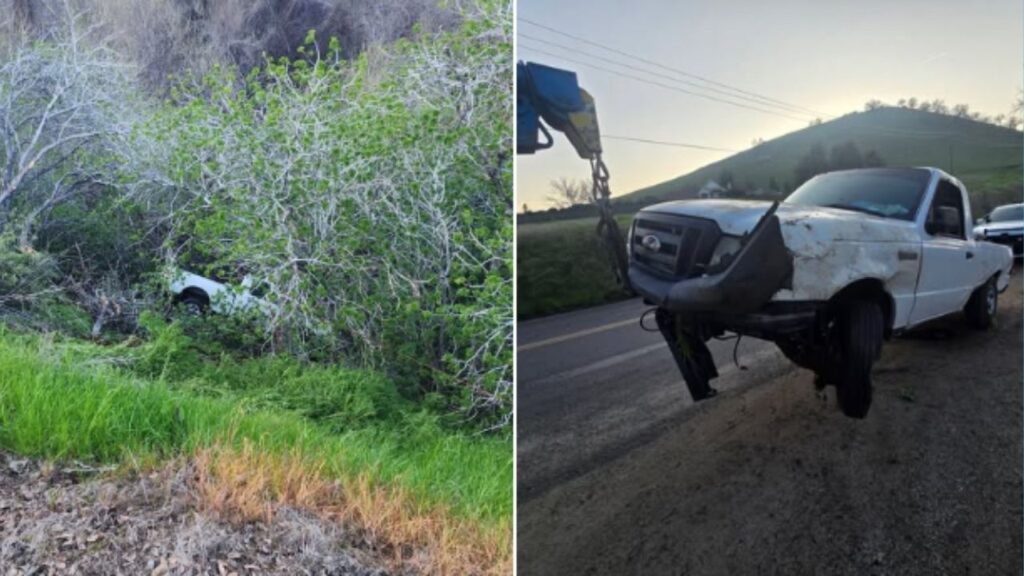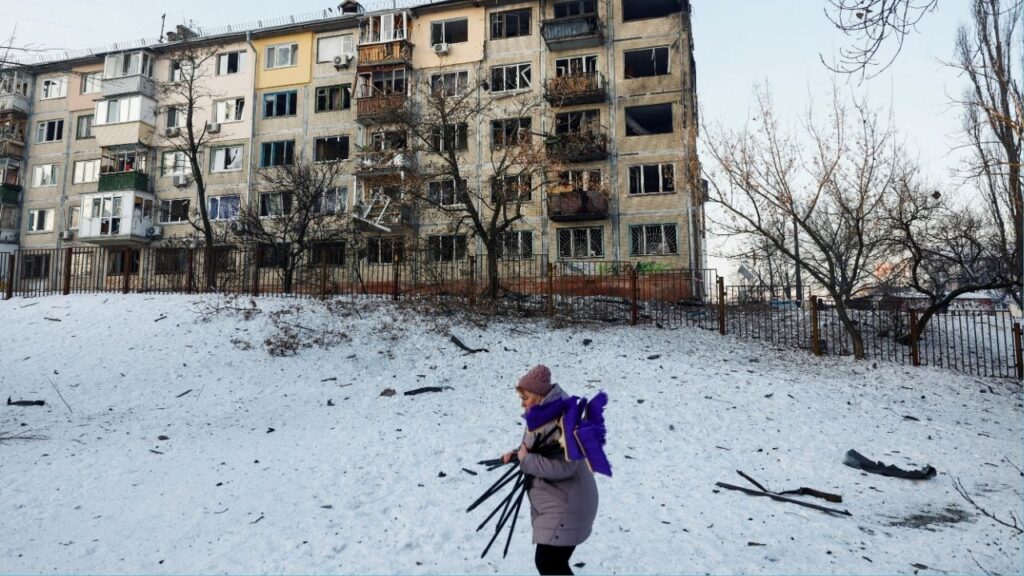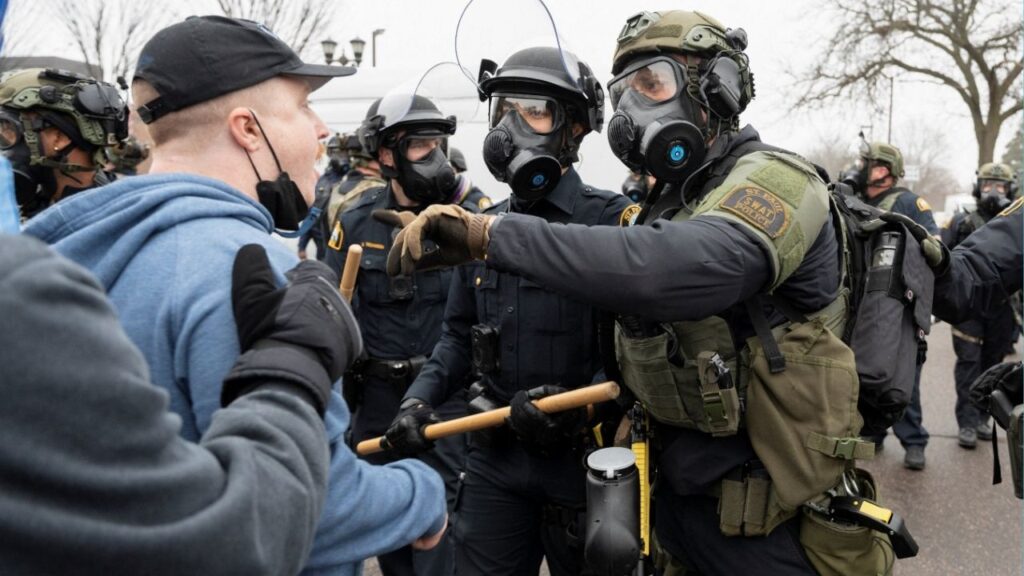Parents drop off their children at a school in the Fresno Unified, June 4, 2025. New research shows that after recent deportation sweeps, parents kept their children home — with big impacts on how all students learn. (Mark Abramson/The New York Times)

- Stanford study finds that student absences in the Central Valley jumped 22% around the time ICE raids occurred.
- Immigrant parents said they feared being arrested while their children were at school and being deported without them.
- The spike in absences is equivalent to the average student missing about 15 days of school each year, up from 12 days.
Share
|
Getting your Trinity Audio player ready...
|
As President Donald Trump promised mass deportations, educators sounded alarms that the actions could scare families away from school, affecting both immigrant and nonimmigrant students.
Now, new research provides evidence that immigration raids did appear to lower school attendance. A Stanford University study found that parents kept their children out of school more often after raids swept California’s Central Valley this winter.
The findings suggest raids can harm student achievement and disrupt how schools function, even when they do not occur on or near school grounds. The study, by Thomas S. Dee, a professor of education at Stanford University, found that daily absences jumped 22% around the time raids occurred.
Last week, the administration deployed troops to Los Angeles in response to protests against deportations. Absences went up, even though the district tried to reassure families that schools were safe.
The new paper looked at attendance data from five school districts in the southern part of the Central Valley, serving a total of over 100,000 children. Public schools do not track immigration status. But a majority of students in the region are Latino, many the children of farm workers with uncertain legal status. Those workers help produce about a quarter of the nation’s food — fruits, vegetables, grains and nuts.
Dee examined three years of attendance data. He found an unusual spike in absences in January and February following “Operation Return to Sender,” a series of immigration sweeps conducted by U.S. Customs and Border Protection.
Dozens of day laborers and field workers were arrested at a Home Depot, in parking lots and at gas stations.
The operation took place in the final days of President Joe Biden’s term. But it was seen as a sign of the immigration enforcement agency’s enthusiasm for Trump’s agenda. Since then, immigration sweeps in California and across the country have been sporadic, though highly publicized.
And on Friday, immigration officials paused raids targeting farmworkers, among others, after the president acknowledged earlier in the week that the raids were hurting the agricultural industry.
Rather Than Risk Separation, Parents Keep Students Home
In the Central Valley, immigrant parents said that after the January raids, they feared being arrested while their children were at school and being deported without them. Rather than risk separation, some parents kept children home.
The spike in absences is equivalent to the average student missing about 15 days of school each year, up from 12 days, according to Dee’s paper.
He called the findings “a canary in the coal mine” for public education. If absences continue to be elevated, they could threaten student learning and children’s mental health.
Funding is also at risk, since schools in California are paid according to student attendance.
Teachers may have to adjust the curriculum to meet the needs of students who have fallen behind after missing class. School counselors and social workers are already devoting more of their hours to tracking down missing children and to treating their anxiety about deportation, according to educators in the region.
The new paper echoes past research that found that under Trump, Biden and President Barack Obama, immigration raids led to decreases in student attendance at nearby schools.
Many immigrants in the Central Valley said that while fears of deportation had always hung over them, anxiety has never been higher. It is fueled by Trump’s aggressive agenda and rhetoric, and by stories of family separation and children placed in foster care, often shared via social media.

Losing a Life Built in California
One Mexican father of two schoolchildren in Fresno, ages 14 and 6, said that deportation alongside his wife and children would mean losing possessions, wealth and his work as a mechanic. In California, he and his wife, a farmworker, had carefully built a life.
But while losing that life would be difficult, deportation without their children, he said, was simply unthinkable.
Like other migrant parents, the man asked to remain unnamed because of his uncertain legal status.
He has cut out many of his family’s nonessential trips outside their home but has continued to send his children to school.
Many others have not.
A Fresno mother, also from Mexico, was so fearful of being deported if she left her home that she paid someone else to drive her daughter to school. She also asked that her name not be used.
She eventually resumed drop-offs, which is when she noticed a change at the school’s doors. There were fewer children waiting in line to file into the building. Half a dozen families she used to see at drop-off were no longer there.
In a written statement responding to the research findings, Abigail Jackson, a White House spokesperson, said, “Illegal immigration is incredibly disruptive to all Americans, including families, students and teachers. The Trump administration won’t apologize for enforcing the law and restoring order to American communities.”
Superintendent Her Makes Home Visits
The spike in missed learning is occurring as educators continue to address a preexisting crisis of chronic absence, caused by the COVID-19 pandemic.
In Fresno Unified, the region’s largest school district, Superintendent Misty Her makes several home visits per week, seeking to speak with families whose children have stopped coming to school.
Her goal is not to shame them, she said, but to understand why and to offer help.
In the past, she said, many seasonal farm workers would relocate to work in the fields during harvests and leave their children in the city with family members or friends, so the children could continue to attend school.
Now, she said, parents are bringing their young children with them, because they are fearful of being deported without them.
While she tries to convince parents to send their children back to the classroom, she also offers the option of enrolling students in the school district’s virtual academy.
“We get them their laptop and a hot spot so they can continue online,” she said, noting that for some students, that routine worked well during pandemic school closures.
Her said she and her staff had carefully tracked the increase in absences reported in Dee’s study. Younger children have been more likely to miss school than older ones, according to the paper, which fits a pattern in which parents in the country illegally keep their most vulnerable children home out of fear of separation.

Before the Raids, School Attendance Was Improving
Before January’s immigration raids, school attendance in the Central Valley had been improving, according to Dee’s analysis. But anxiety over deportation returned some immigrant families to a cloistered, pandemic-like existence.
Immigration sweeps “can essentially create what we found from COVID — this generation of students who have a patently different experience with schooling,” said Jacob Kirksey, a professor of education at Texas Tech University who has studied how immigration arrests increase absences and lower student achievement.
But he argued that policymakers should be cautious about directing fearful families toward virtual learning.
“Kids learn better in person,” he said, warning about a further loosening of the expectation that students show up for school, day in and day out.
Kirksey said Dee’s study was methodologically strong. He also suggested it could encourage policy change.
Since immigration enforcement lies outside the control of school systems, states could consider limiting the practice of tying school funding to attendance, he said, and could see raids as events more like natural disasters, which prompt extra funding and support.
Some Students Never Return
Some of the absent children may never come back to school, because their families may have left the country voluntarily — the stated intention of Trump’s immigration agenda.
Nereida Galvez works at a Fresno nonprofit that supports immigrants from Indigenous Mexican communities. She was in contact with one family that decided to leave the United States.
“They were afraid that their children would be left alone,” she said, “so they decided to take their children with them.”
This article originally appeared in The New York Times.
By Dana Goldstein and Irene Casado Sanchez/Mark Abramson
c.2025 The New York Times Company
RELATED TOPICS:
Categories

US Pushes to Widen Talks With Iran Beyond Nuclear Issue

Congress Targets Housing Crisis as Solutions Elude Trump

Driver Walks Away Unharmed After Solo Crash East of Porterville
















